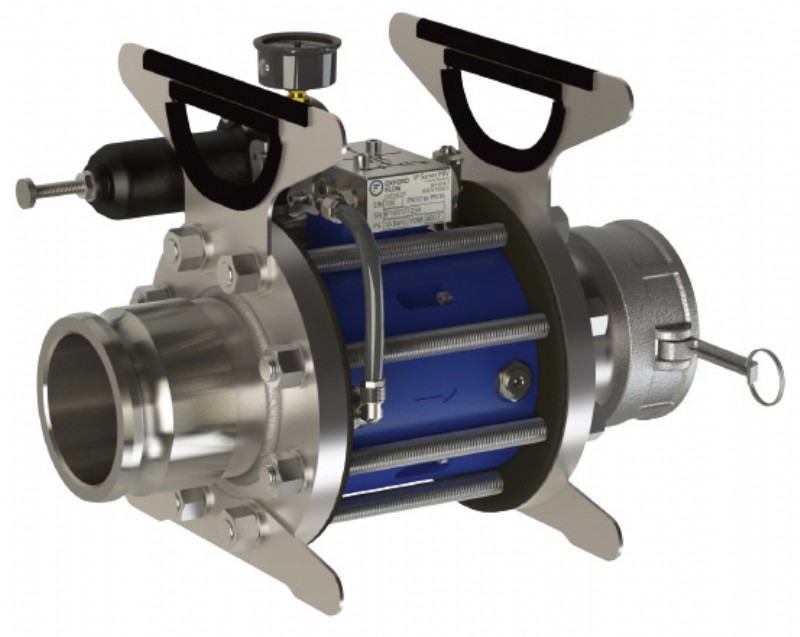Easing the pressure: Veolia tackles water regulation with Oxford Flow
Water services provider tackles the weighty challenge of pressure regulation


Neil Poxon, CEO, Oxford Flow
Veolia was one company facing this very real problem. Its Mobile Water Services Division is a market leader in the provision of onsite purified water services from purpose-built HGV trailers to industrial processors and plants across the UK and Europe.
In pressure management, too high an outlet pressure creates a huge risk of damaging expensive assets. However, insufficient outlet pressure could result in the failure to fully purify the system, which could reduce the quality of products or processes. Veolia recognised that accurate pressure control, from the hydrant supply through to the purification system and into the client’s system, was vital to delivering an efficient service and maintaining customer satisfaction.
James Carr, European Operations Director - Mobile Water Services at Veolia Mobile Water Services, said: “Our equipment needs to connect to many different customer utilities, which means lots of pressure differentials and varying flow rates. At the time, this was challenging to manage and posed a risk to both our and our clients’ equipment.”
A weighty burden
Veolia had to regularly manage very large pressure drops, which meant having two pressure reducing valves (PRVs) to reduce the pressure over two stages.
The problem was that the two separate products added up to some more than 100kg of equipment on their trailers, which reduced portability and increased the kerb weight of the trailers. Instead, it needed a provider to help it develop and deploy a more mobile and accurate solution for hydrant PRV assemblies.
The company turned to Oxford Flow, the manufacturer of innovative pressure control equipment, including the world’s first polymer PRV. James Carr explained: “The valves we’d been using were extremely heavy, making installation tricky and expensive. We’d been looking for a solution to this issue for a long time, and Oxford Flow’s PRV offered a new approach because it was made of polymer and far lighter than all other comparable devices. We knew this would make installation much easier and greatly reduce our labour costs.”
The PRVs came with integrated handles, supports and quickfit connections, meaning Veolia could easily install them. Often, companies rule out any kind of pressure regulation in hard to service infrastructures or – in Veolia’s case – have managed with heavy duty setups. However, Oxford Flow’s flexible and simple design makes pressure regulation far more accessible and cost-effective.
More streamlined, better performance
The rugged light-weight design of Oxford Flow’s products allowed for easy adjustment of the set pressure as well as control of the speed of response. This made it much quicker and more efficient to set up and deliver precisely controlled pressure and flow exactly to the customer specifications.
Because weight was a big issue, Veolia had been looking at ways to reduce the size of its trailers.
In particular, it wanted to fit more of its processing fluid onto the vehicles but without increasing the weight.
A major advantage of Oxford Flow’s products was that Veolia was able to streamline its infrastructure from two PRVs weighing some 60 kilos each to just one PRV weighing around 25 kilos. As a result, it had a much more efficient solution that could reduce from a very high pressure in just one stage.
In addition to reducing the number of PRVs and overall weight, Veolia could increase its performance. Often, maintaining high performance at the lower end of the pressure spectrum can be a challenge. However, Oxford Flow was able to deliver market-leading head loss performance. James Carr added: “Because pressure can be controlled with such precision by these devices, there is reduced hunting. Flow turbulence and headdrop are also minimised – and we’ve found it less noisy too.”
Reducing costs was an important outcome for Veolia. One valve meant more manoeuvrability and potentially less labour to manage it. In addition, saving more than 50 per cent of the weight of installation had major implications in terms of fuel consumption so, with less to carry around, Veolia could reduce the overall carbon footprint of its trailer.
A change of tide Neil Poxon, CEO at Oxford Flow, added: “This assembly used Oxford Flow’s IP series PRVs, which are ideally suited to water distribution companies in potable water network field trials across Europe.
“The PRVs are manufactured using WRAS-approved Acetal resin, making it considerably lighter – it can weigh as little as a tenth of that of the competitors’ PRVs. This massive reduction in weight has allowed us to permanently fit quick-release connections to the unit to enable rapid deployment on-site.”
Ultimately, working with Oxford Flow has allowed Veolia to develop a more competitive water management offering. The real breakthrough was discovering that just one PRV could handle the pressure regulating flow rates that previously required two PRVs.
This opened opportunities for new ways of working and could enable many more companies to access pressure regulation services for perhaps the first time.
Tel: 01865 595 248
Email: info@oxford-flow.com
Web: www.oxford-flow.com
Published: 23rd August 2018
Rachel Wormald, Managing Director at YPS Valves Ltd and Elizabeth Waterman, ...
Are you looking for industry-leading, brand independent valve and actuator ...
As can be seen from the photograph, clearly the resident birds at Bartlett ...
Howco Group has unveiled its latest £1million investment, with the ...
In 2024, Allvalves is poised for an exciting year of growth and expansion, ...
GMM Pfaudler Engineered Plastics & Gaskets are delighted to bring the ...
In the ever-evolving valve industry, GMM Pfaudler stands out for its ...
SAMSON Controls Ltd – part of the SAMSON group - a renowned leader in ...










